- Home
- Newt Gingrich
A Nation Like No Other Page 23
A Nation Like No Other Read online
Page 23
The community came together and an overwhelming 95% of the voters, said “BASTA” to the old council members and their corrupt practices. In order to ensure our work was not in vain we must keep vigilant and involved.
BASTA still has a lot of work. 35% of the voters participated yesterday, that’s 3 times as much as past municipal elections, but still shy of where we should be. We made progress, but a reminder that changing a culture and bringing about real change won’t happen overnight and that we have a lot of work ahead for us.
Let’s celebrate this new start and the victories we have experienced together over the last 8 months, but let’s not forget that our work is not done and democracy only works if we stay involved and informed.17
WORK AND INNOVATION
THE DC SCHOLARSHIP OPPORTUNITY PROGRAM
Our Founders’ emphasis on individual liberty and free enterprise helped to create the most innovative society in human history. But innovation suffers when competition is stifled and mediocrity is protected—and that’s what is happening in our public education system today. Restrictive work rules and powerful teachers unions are preventing many public schools from experimenting with new approaches to education, leading to student failure. For example, in California’s Los Angeles Unified School District, 50 percent of students are not graduating from high school, and a full 90 percent don’t make it to college.18
But thanks to the hard work of concerned parents, things are beginning to change. A great example is the renewal of the DC Scholarship Opportunity Program. Begun in 1994, SOP was the first federally funded school-voucher program in the country. It provided nearly 2,000 children from low-income families in Washington, D.C. with scholarships of $7,500 a year to cover tuition and fees at participating private schools.
After a few years, the program showed tremendous results and had earned broad local support. Here are some of its accomplishments:• Students who used their scholarships had graduation rates of 91 percent.
• The Department of Education’s Institute for Education Sciences found that SOP had one of the largest achievement impacts of any of the programs studied.
• Four studies from Georgetown University and the University of Arkansas showed that parents of SOP recipients were becoming more active and astute educational consumers.
• A February 2011 Lester & Associates poll found that 74 percent of D.C. residents support reauthorizing the SOP program.19
Despite these stellar results, in spring 2009 congressional Democrats passed—and President Obama signed—a spending bill that failed to reauthorize the program. This decision, a clear gift to the teachers unions, provoked the anger of poor D.C.-area parents whose kids were deprived of a lifeline that had helped some students escape the city’s disastrous public schools. These parents, led by Virginia Walden Ford of D.C. Parents for School Choice, then began a two-year campaign to renew the scholarship program.
The parents’ activism kept the issue alive despite Congress’ refusal to reconsider its decision. The tide turned after the 2010 midterm elections, when Republicans regained control of the House of Representatives and vowed to revive SOP. As a vote on the issue approached, Ford wrote, “Parents across the country are watching Congress right now to see if their members will do the right thing and stand courageously with children who only want a better future—or if they’ll side with richlyfunded special interest groups that place adults and the status quo above the needs of low-income families.”20
On March 30, 2011, with the outspoken support of Speaker John Boehner, the House of Representatives passed the SOAR Act, which would reopen SOP and provide $20 million annually for five years for new scholarships, along with another $20 million apiece for D.C.-area charter schools and traditional public schools. At the Republicans’ insistence, the bill was included in the budget deal of April 2011 and signed into law by President Obama.
Upon SOP’s revival, National Review’s Kathryn Lopez remarked that “John Boehner just walked Barack Obama into being a civil-rights leader.”21 There’s some truth to that, but the real architects of this victory were the people of Washington, D.C.—people like Virginia Walden Ford.
ANDREA WECK AND THE FIGHT FOR SCHOOL CHOICE
On May 29, 2009, Arizona governor Jan Brewer approved a bill known as “Lexie’s Law,” which saved private school scholarships for special needs and foster children from being eliminated by opponents of school choice. The law was named for Lexie Weck, a then-seven-year-old girl with autism, cerebral palsy, and mild mental retardation. Lexie’s mother Andrea used an Arizona voucher program to transfer Lexie from a failing public school to Chrysalis Academy, a small, private school in Tempe for autistic children.
Lexie made great progress at Chrysalis, but her continuation there was jeopardized when the Arizona Supreme Court sided with teachers’ unions, the ACLU, and various other organizations that had sued to shut down the voucher program. Nevertheless, the fight for school choice continued, as Arizona parents like Andrea Weck pressured lawmakers to find a substitute for the program. Ultimately, the legislature passed “Lexie’s Law,” which created a $5 million tax credit for businesses that help fund schooling for children with disabilities.22
Said Weck at the signing, “I am incredibly grateful that the legislature and governor moved so quickly to save the scholarships my daughter and hundreds of other children rely on.… Attending a school that meets her needs has changed Lexie’s life, and I am honored that the legislature named this program after my beautiful little girl.”23
FREE SPEECH IN OUR NATION’S CAPITAL
Bill Main and Tonia Edwards own a company in Washington, D.C. that provides tours of the city on Segways, two-wheeled electric vehicles. They thought they had created an innovative, successful little business for themselves—until they ran up against the D.C.-area bureaucracy.
Following the grand government tradition of issuing useless, stifling regulation, D.C. authorities adopted a rule requiring tour guides to pass a test and secure a government permit if they plan to describe people and places in the city. If they don’t get the permit, they could face up to ninety days in jail. So Bill and Tonia sued the government to withdraw the regulations on free speech grounds. In February 2011, a federal judge upheld the permitting requirement.
Bill and Tonia lost their case, but they drew public attention to the growing problem of occupational licensing requirements, which are making it increasingly difficult and expensive for everyday people to start up and operate a small business. According to the Institute for Justice, which represented Bill and Tonia in their lawsuit, the percentage of the workforce required to obtain a government license has jumped from less than 5 percent in the 1950s to more than 30 percent today.
These kinds of onerous bureaucratic requirements not only suppress economic activity, they impinge on our freedom, as the Institute of Justice explained: “Particularly as the nation tries to recover from a massive recession—and as individuals who have lost their jobs try to start over, often by starting their own businesses—it is imperative that people be allowed to pursue their dreams without the government standing in their way imposing unnecessary barriers in the form of occupational-licensing requirements. Only by setting people free—to describe, to create, to work—can we truly create sustained economic growth.”24
SAFETY AND PEACE
KEEPING TERRORISTS OUT OF THE BIG APPLE
The beginning of an NBC New York story on January 30, 2010 said it all:Democracy does work.
After a growing number of regular people and powerful politicians alike had begged to move the 9/11 terror trials, Obama administration officials confirmed to NBC News that they will not hold the trials in New York City.25
Having repeatedly denounced his predecessor’s prosecution of the War on Terror, President Obama took office vowing to do away with military tribunals for terrorism suspects and instead to try them in U.S. civilian courts.
But when the Obama administration announced its intention to
transfer 9/11 mastermind Khalid Sheikh Mohammed and four other accused terrorists to civilian courts in New York City, near the site of the most devastating terrorist attack on America in our history, Americans rose up in protest. The backlash was most visible in New York City itself, where numerous demonstrations were staged by grassroots organizations such as the 9/11 Never Forget Coalition, a diverse group comprising families of 9/11 victims, first responders, military families, war veterans, and other concerned Americans.
In advance of its December 2010 rally, the coalition announced, “This Coalition was formed to fight the decision of President Barack Obama and Attorney General Eric Holder to try the 9/11 co-conspirators in New York City’s federal court, effectively giving war criminals the same rights as American citizens while endangering the safety of all New Yorkers.”26
As the public outcry intensified, local city leaders as well as national political figures began speaking out against the administration’s plans to bring terrorists to the American mainland and treat them like ordinary criminals. Eventually, the administration was forced to back down and end its two-year-long moratorium on military tribunals for terror suspects. Thanks to the willingness of thousands of New Yorkers and many other Americans to take a public stand, today Khalid Sheikh Mohammed remains right where he belongs—in Guantanamo Bay.
In America we see protests all the time representing a galaxy of political perspectives. They used to be dominated by the Left, but in recent years, an energized, grassroots conservative movement has emerged whose adherents are unafraid to voice their objections to the constant encroachments of government. In tea parties and town hall meetings, from Bell, California, to New York City, Americans are speaking out like never before against over-reaching and irresponsible government on the local, state, and national levels.
As we make our voices heard, we must never forget how few nations enjoy the most basic rights—to speak freely, worship freely, and petition their leaders for a redress of grievances. People throughout the world are persecuted for speaking against their governments the way we do every day. As I write these words, Syrian army units and police forces are killing their own people in the streets. The victims’ crime? They gathered together to seek changes to government policies.
Though we sometimes take them for granted, our rights are unusual in this world—and they existed almost nowhere else when our Founders enshrined them in our nation’s founding documents. To not only have these rights, but to live in a country founded for the express purpose of securing them, is an exceptional privilege enjoyed by every American—and one we must guard with eternal vigilance.
CONCLUSION
JANUARY 20, 2021
The election of 2012 will bring us to an historic crossroads. The direction we choose will determine whether we will continue as an exceptional nation or follow a path of decline and fade into mediocrity, inadequacy, and failure.
In 1900 many people believed that the twentieth century would be dominated by Britain, just as the previous century had been. Yet two world wars and two generations of socialism laid waste to British prosperity, power, and global leadership. By 2000 no one could deny the twentieth century had, in fact, been the American century. What will be said of the United States in the year 2100, or even 2050? That choice will be made by the American people.
Let’s be clear what this choice entails: we can cultivate an America that reaffirms and recommits to the self-evident truths of the Declaration of Independence that have made us a nation like no other in history. This choice leads to a future of even greater opportunities, a future that is freer, safer, healthier, and more prosperous.
Or we can reject these truths and surrender to a debt-ridden, government-centric system dominated by politicians and stultifying bureaucrats who will gladly manage our decline as long as they stay in charge. This choice will lead to economic ruin and an increasingly dangerous world.
Those are the stakes of the 2012 election.
A PEOPLE’S MOVEMENT TO REPLACE THE LEFT
While the election of 2012 is the first step toward a better future, I believe we must look further down the road than November 6, 2012; the key date is actually January 20, 2021.
If we are successful in replacing the Left and restoring American Exceptionalism, by January 20, 2021, eight years after the 2012 election, America will be stronger than at any time in our lifetimes. On that day, a new conservative president will be taking the oath of office. Looking on will be both houses of Congress, led by strong majorities that believe in American Exceptionalism and are working to strengthen and protect it every day. The federal government will have turned significant powers back to the states, local governments, and the people—including the more than 513,000 elected officials in the United States who serve as governors, state legislators, and as members of school boards, city councils, and county commissions. And our nation will be reaping the rewards that come from listening to the American people.
The hard, steady work of returning power to the people will be far more important than the decisions of any one person. No man or woman in the Oval Office can achieve change on this scale. It will require the active participation of millions of Americans.
Conservatives will need a long-term commitment and strategic vision to reverse the damage the Left has done to America. After all, in its quest to transform America into a radically secular, government-controlled utopia, the Left has spent a century building up a system dominated by bureaucrats and special interest groups. And the Left continues its crusade today despite the undeniable failure of its vision, as evident in the wreckage of so many countries that turned to socialism or other forms of central planning. Its own track record shows that the left-wing governing philosophy of class warfare, class envy, and the redistribution of wealth is incapable of meeting the challenges of the twenty-first century.
The system we are fighting for is the one established by our Founders, a republic that rewards work and merit, cultivates civil society and faith, confronts and defeats threats to our way of life, and returns power to the American people. Benjamin Franklin wondered whether Americans could keep such a republic. Abraham Lincoln answered this question for his generation at a battlefield at Gettysburg four score and seven years after the signing of the Declaration of Independence:It is for us the living, rather, to be dedicated here to the unfinished work which they who fought here have thus far so nobly advanced. It is rather for us to be here dedicated to the great task remaining before us—that from these honored dead we take increased devotion to that cause for which they gave the last full measure of devotion—that we here highly resolve that these dead shall not have died in vain—that this nation, under God, shall have a new birth of freedom—and that government of the people, by the people, for the people, shall not perish from the earth.
Now, we too must answer Franklin’s question for our own generation.
It will not be enough to reject the Left’s big government policies at the ballot box—the American people did that in 1972, 1980, 1994, and 2010, yet the Left carries on, seemingly undiminished. That’s because its power stretches beyond public office to the commanding heights of our society—our academic institutions, newsrooms, courtrooms, and throughout the fields of arts and entertainment.
If we are to reclaim our Founders’ republic, we must not merely reject the Left and its failed policies, but replace them. To do that, we need three things: a positive vision to offer the American people; the votes to implement it; and the will to carry it through. This effort should be propelled by a political movement that can communicate why we must change, how we can accomplish that change, and what responsibilities that change will require of every individual. In building this movement to replace the Left, we should take inspiration from the First Continental Congress, which in 1776, in the Declaration of Independence, made its own historic call for replacing the corrupt, abusive system of its day with a new model based on superior values.
The new conservative moveme
nt must be just as committed to freedom as were the revolutionary signers of the Declaration. Just as in their day, today’s patriots are farmers, shopkeepers, doctors, entrepreneurs, coal miners, and workers from every corner of America. As the Left struggles to rend our traditional bonds of family, community, and country, and to dissolve the American nation into a collection of rival interest groups scrambling for their own piece of the government pie, it is the ideals of the Declaration which again must bind us together.
THE FOUNDERS’ STRUGGLE BECOMES OUR OWN
In the hard winter of 1778, General George Washington committed the American colonists to victory by building up a well-trained professional army. He recruited new soldiers, steeled the will of veterans, and equipped them all for the fight ahead. It was not enough to declare independence; it had to be won on the battlefield. As Thomas Paine so rightly declared in 1776, “Heaven knows how to put a proper price upon its goods; and it would be strange indeed if so celestial an article as FREEDOM should not be highly rated.”
After their improbable victory, the Founders had to ensure the principles they had fought for were embodied in their founding documents, realized in their own lives, and preserved for generations to come. When their first attempt to codify these values of liberty—the Articles of Confederation—proved inadequate, they acknowledged its flaws and worked out a replacement. The result was the United States Constitution, the greatest source and guarantor of the rule of law and human liberty in history.
The Founders succeeded in their task in one generation; they rejected tyranny, won their liberty, and secured it for themselves and future generations. They challenged subsequent generations to safeguard the republic and make it even stronger and freer. In their wisdom, they gave us the tools to accomplish that task. Generations of Americans since have accepted that challenge and proved themselves worthy of the Founders’ bequest.

 1945
1945 Collusion
Collusion Trump's America
Trump's America Shakedown
Shakedown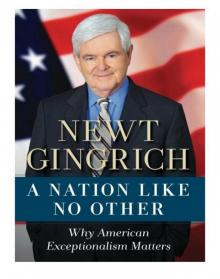 A Nation Like No Other
A Nation Like No Other To Try Men's Souls - George Washington 1
To Try Men's Souls - George Washington 1 Pearl Harbor: A Novel of December 8th
Pearl Harbor: A Novel of December 8th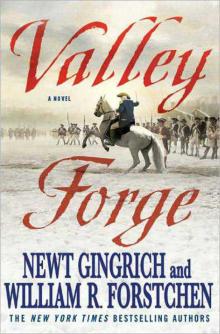 Valley Forge: George Washington and the Crucible of Victory
Valley Forge: George Washington and the Crucible of Victory To Save America
To Save America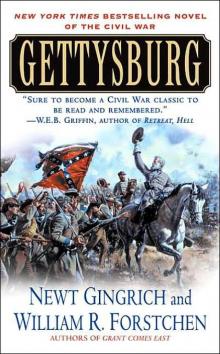 Grant Comes East cw-2
Grant Comes East cw-2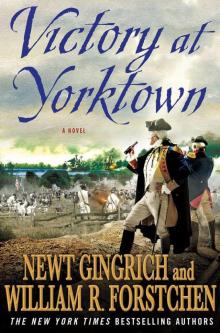 Victory at Yorktown: A Novel
Victory at Yorktown: A Novel Days of Infamy
Days of Infamy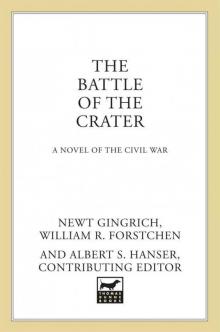 The Battle of the Crater: A Novel (George Washington Series)
The Battle of the Crater: A Novel (George Washington Series)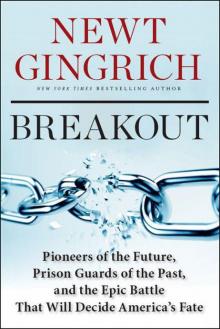 Breakout: Pioneers of the Future, Prison Guards of the Past, and the Epic Battle That Will Decide America's Fate
Breakout: Pioneers of the Future, Prison Guards of the Past, and the Epic Battle That Will Decide America's Fate Pearl Harbour and Days of Infamy
Pearl Harbour and Days of Infamy Pearl Harbour - A novel of December 8th
Pearl Harbour - A novel of December 8th Understanding Trump
Understanding Trump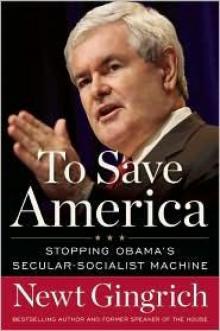 To Save America: Abolishing Obama's Socialist State and Restoring Our Unique American Way
To Save America: Abolishing Obama's Socialist State and Restoring Our Unique American Way